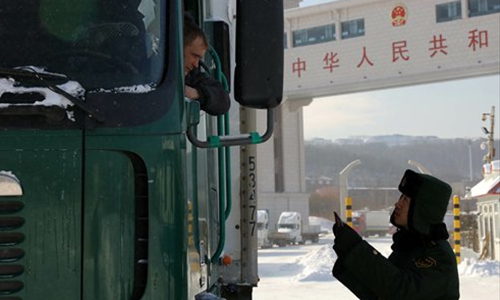HOME >> CHINA
Land ports beef up drive against imported infections
By Wang Qi Source:Global Times Published: 2020/4/7 21:03:40

A security officer checks a truck at the border checkpoint in Suifenhe in Northeast China's Heilongjiang Province.Photo: IC
Chinese land ports around the country are enhancing prevention and control measures on imported coronavirus cases amid a flood of land arrivals after most inbound flights were canceled.
The number of imported cases detected at land ports has exceeded those discovered at airports, China Central Television reported on Monday, without providing specific numbers.
Southwest China's Yunnan Province, with a border of more than 4,000 kilometers, suspended passenger transport service in 14 out of its 19 land ports on March 31. All arrivals from neighboring countries must undergo a 14-day isolation period and nucleic acid testing at their own expense.
Suifenhe port in Northeast China is under a lockdown order, which started on Tuesday and will run until April 13.
The Suifenhe port has drawn public attention as imported cases through the Moscow-Vladivostok-Suifenhe route have continued to rise for three consecutive days. There were 13 on Saturday, 20 on Sunday and 22 on Monday, bringing the total number of imported cases detected at this port to 59.
Facing this surge, the Chinese consulate-general in Vladivostok issued warnings for three continuous days since Sunday on its website, strongly advising Chinese nationals to avoid passing through Suifenhe port and clearly consider the infection risk during long journeys.
All of the imported cases detected at Suifenhe were Chinese nationals who flew from Moscow to Vladivostok, then went to Suifenhe by bus, according to the Heilongjiang health authority.
Suifenhe, a small county-level city bordering the Russian Far East region was formerly the only 24-hour land port in Heilongjiang.
A local resident of Suifenhe, who requested anonymity, told the Global Times on Tuesday that the real pressure comes from a lack of medical supplies and staff in the city.
He said that there are four designated sites for quarantine around the city but the capacity is close to saturation, and the city has started to build a makeshift hospital. The imported patients with mild symptoms are being placed in a local hospital in Suifenhe, while those in serious conditions are sent to another hospital in Mudanjiang city.
The man said he is not worried about the imported cases as these people have zero contact with local residents.
According to reports, more than 120 medical personnel from Mudanjiang and other nearby cities arrived at Suifenhe on Monday to offer support.
Yin Bin, head of the Center of the Moscow-based Russia-Chinese Humanitarian Cooperation and Development, told the Global Times on Tuesday that many Chinese people earning a living in other countries are coming home as the pandemic has cut off their incomes. Besides, some overseas Chinese in Russia feel China is safer in terms of the situation of containing the coronavirus.
As to the situation in Russia, Yin said his daily life is not that much affected as people are still able to go out on the condition of full self-protection, and the supermarkets also provide delivery service.